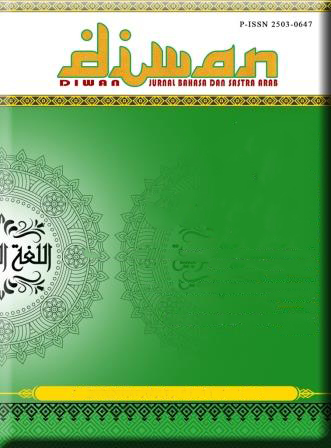نقد طه حسين على الشعر الجاهلي ومساهمته في الدراسة الأدبية
Taḥā Ḥusayn's Criticism of Pre-Islamic Poetry and his Contribution to Literary Studies
Abstract
هذه الدراسة تهدف إلى تحليل نقد طه حسين على الشعر الجاهلي، والطرق التي سلك بها هذا الأديب في نقده وذلك لسحب مساهمته في الدراسة الأدبية. قام الباحث في هذه الدراسة بمنهج تحليل المحتوى بتحليل آراء طه حسين النقدي في مؤلفاته والنظر إلى أراء العلماء عنه المنشورة في المصنفات، ولجمع البيانات يستخدم الباحث منهج البحث المكتبي أو استطلاع الكتب فمن ثم يتم بسرد المعلومات وتصنيف البيانات لتفسيرها مستخدما منهج تحليل الاستنتاج والاستقراء. توصل البحث إلى أن طه حسين قد شك في أصالة الشعر الجاهلي وأكد أن أكثرها منحولة بعد ظهور الإسلام، وقد نهج منهجالمستشرقين في أغلب آرائه حول الشعر الجاهلي حتى شك في قيمة الأدب الجاهلي كما ابتغى إلى إعادة الإنتاج الثقافي العربي والثورة والتجديد من خلال دعوته. ولقد قدم مقتربًا اجتماعيًا ومنهجًا علميًا في دراسته للتاريخ، وإن ذلك المنهج العلمي التاريخي، والمذهب الاجتماعي في تفسير التاريخ هما الأساس والجوهر لمساهمته الفكرية الكبرى في الحياة الفكرية العربية المعاصرة.
Abstract
This article aims to analyze Taḥa Ḥusayn's criticism of pre-Islamic poetry, the methods he used in his criticism, and his contribution to literary studies. The researcher used a descriptive approach to analyze several texts from the opinions of scholars published in books. The data was collected using a library research method or book survey. The data was then classified and interpreted using deductive and inductive analysis. Taḥa Ḥusayn followed the path of Orientalists in most of his views on pre-Islamic poetry, even questioning the value of pre-Islamic literature. He also sought to revive Arab cultural production and revolutionize and renew it through his call. Before criticizing the poetry of any poet, Taḥa Ḥusayn called for knowing the poet's personality and understanding the environment in which he lived. These are the circumstances surrounding the poet that affect his poetry. Therefore, there is something very important in criticism, which is the artistic pleasure of enjoying the text. Regardless of the controversies surrounding this writer, we should not forget that he was a great writer, even known as the Dean of Literature. This title is only given to the best of people. This is what arouses the need to review the contribution of this writer to literary studies, which his previous scholars did not pay attention to or mentioned only a small part of it.
Downloads
References
Ilham, Ramdahan, and Haniah, ‘تطور مفهوم الأدب العربي : دراسة لغوية تاريخية’, JALI, I.1 (2019), 1–13
Muzakki, Akhmad, ‘Unveiling Thaha Husein’S Controversy on Classical Arabic Literature Existence (Critical Methodology of the Book “Fi Al-Adab Al-Jahili”)’, LiNGUA: Jurnal Ilmu Bahasa Dan Sastra, 15.1 (2020), 11–22 <https://doi.org/10.18860/ling.v15i1.9493>
RACHID, Mahıeddın, and Selami BAKIRCI, ‘نظرة جديدة في نقد الأدب العربي’, Atatürk Üniversitesi Sosyal Bilimler Enstitüsü Dergisi, 25.3 (2021), 1007–21 <https://doi.org/10.53487/ataunisosbil.932284>
Wijaya, Aksin, ‘Menggugat Otentisitas Syi’Ir Jahiliyah’, ’Anil Islam, 3.1 (2010), 2010
الجمحي, ابن سلام, طبقات فحول الشعراء (بيروت لبنان: دار الكتب العلمية, 1998)
الزيات, أحمد حسن, ‘تاريخ الأدب العربي للمدارس الثانوية و العليا’, 2009
العزيز, إوفي مزيد عبد, ‘حدود المنهج النقدي عند طه حسين’, مجلة كلية التربية الأساسية, 20.86 (2014), 55–70
المطيري, سالم محمد عبد الله زيد عبيد, ‘جدال الانتحال بين القدماء والمحدثين في الشعر الجاهلي’, حوليات آداب عين شمش, 49.يوليو-سبتمبر (2021)
حسين, طه, حديث الأربعاء (القاهرة: مؤسسة هنداوي, 2014)
———, في الأدب الجاهلي, 4th edn (مصر: دار المعارف, 1947)
———, في الأدب العربي (القاهرة مصر: دار المعارف, 1979)
———, في الشعر الجاهلي (سوسة - تونس: دار المعارف, 1986)
———, مستقبل الثقافة في مصر (القاهرة: مؤسسة هنداوي, 2014)
ضيف, شوقي, تاريخ الأدب العربي (القاهرة: دار المعارف, 2003)
کوسة, علاوة, ‘ثورةُ الشّکِّ الأدبيّ عند “طه حسين” من خلال کتابه: “في الشعر الجاهلي”.’, المجلة العربية مداد, 5.12 (2021) <https://doi.org/10.21608/mdad.2021.152302>
مرجليوث, ديفيد صمويل, أصول الشعر العربي (دار الفردوس, 2006)













